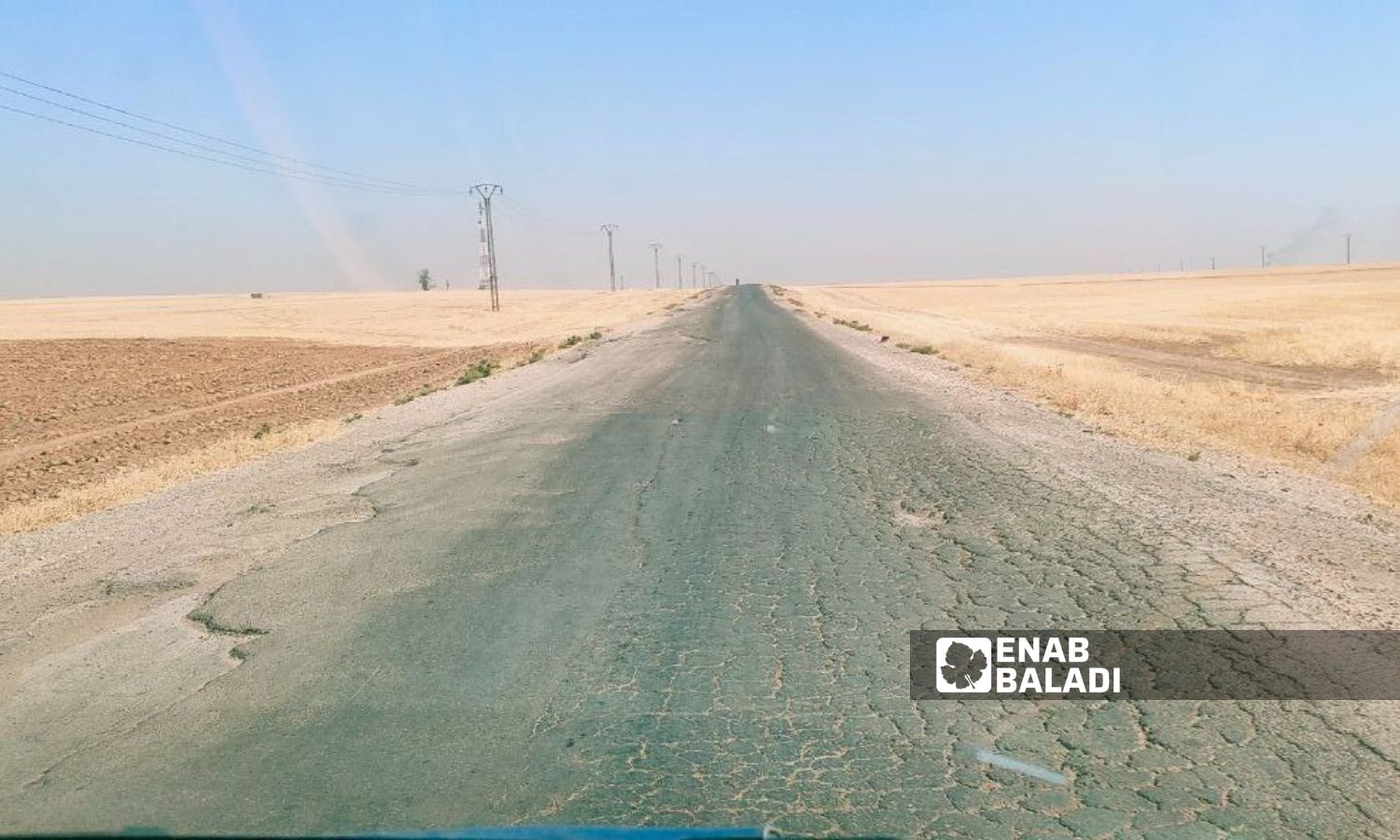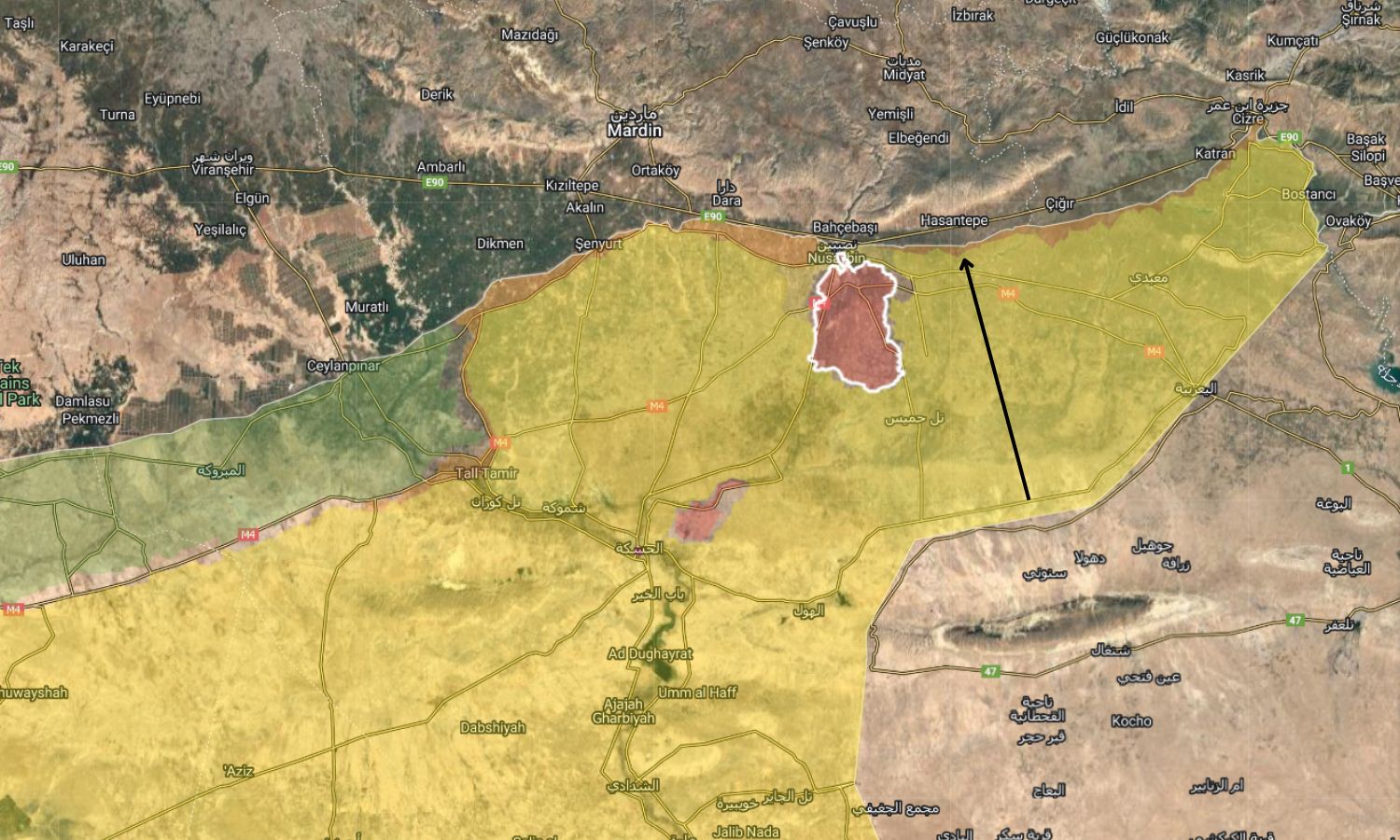



Al-Hasakah – Majd al-Salem
Residents, owners of private cars, and drivers working on the road connecting the town of al-Qahtaniyah and the southern villages of al-Rad town in the northeastern al-Hasakah governorate complain about the deterioration of the road and its poor technical condition.
A road that bears vital importance and is considered the artery of an array of villages located on the Iraqi-Syrian border.
The southern countryside of al-Rad area has been suffering for about eight years from the poor technical condition of the only road that connects it to al-Qahtaniyah district and from there to the rest of the cities of Qamishli, al-Jawadiya, and al-Malikiyah.
Khalil al-Hussein, 45, who makes a daily drive via his van on al-Rad road, told Enab Baladi that the road is full of potholes and cracks and that parts of it are completely damaged and driving on it has become very tiring for drivers.
Al-Hussein added that drivers slow down, avoid potholes, and exit the road onto side dirt roads as if they are testing the calmness of nerves and the vehicle’s ability, pointing out that this suffering has been going on on a daily basis for several years.
The driver said most of the breakdowns that affect his van and other cars are due to this “bad” road, as there is no alternative to it other than the long side roads.
Because of the poor quality of the road, Mohammad al-Sufi, 49, prefers to take side roads in his passenger car (van) on the Qamishli-Qahtaniya-South al-Rad line, although this costs him to travel a longer distance, and the resulting hardship and fatigue during the hot summer weather.
In the morning, Mohammad begins to gather the passengers from the various villages and brings them to al-Qahtaniyah and then to Qamishli, taking different roads, some of which are paved and some that are dirt, and at noon he takes them back to their villages.
The length of the road is about 50 kilometers, and it extends from al-Qahtaniyah district in the south towards the Iraqi border. On both sides, there are dozens of villages that depend on the road to reach the main cities, especially the city of Qamishli.
It intersects with the international M4 highway about one kilometer south of al-Qahtaniyah, as well as with the “Petrol” road (linking M4 with the city of al-Hasakah), about 20 kilometers away.
Hundreds of civilians travel through al-Rad road every day through various means of transportation, most of whom are employees, students, visitors to government departments or for medical purposes, and others.

A sign showing the road of al-Qahtaniyah-Tawil-al-Rad in the city of al-Hasakah, northeastern Syria (Guerra map)
The driver, Mohammad, said that the deteriorating infrastructure causes many breakdowns and accidents, pointing out that car breakdowns and maintenance parts are costly and are calculated in dollars, while he charges six thousand Syrian pounds per passenger, which he considers to be a low fare in exchange for maintenance and access to secondary roads.
Mohammad added that the drivers pay the taxes and fees incurred by their vehicles, yet there are no road maintenance operations in the area.
On the other hand, passengers from the region believe that the fare is high even with the bad roads and the added cost to the driver of maintenance and fuel and that this has become an excuse to increase the fare each time.
Khalil al-Hindo, 49, from the village of Khwitlah, four kilometers away from the Iraqi border, told Enab Baladi that when the people of the region go to the official departments in the city of al-Hasakah, they must go early, given the poor quality of the secondary roads and the main road, al-Qahtaniyah-South al-Rad, so as not to be late in reaching their destination.
Al-Hindo added that the concerned authorities must take responsibility for the maintenance of this vital road so that drivers do not have an excuse to increase the fare.
Enab Baladi contacted the “Al-Shaab” municipality in al-Qahtaniyah district of the Autonomous Administration of North and East Syria (AANES) to obtain clarifications about its role in road maintenance and its comment on the people’s demands, but it did not receive any response until the moment of preparing this report.
All the paving and road maintenance projects announced by the municipality are limited to the town or the eastern and western regions thereof, According to what Enab Baladi monitored on the municipality’s Facebook page.
if you think the article contain wrong information or you have additional details Send Correction